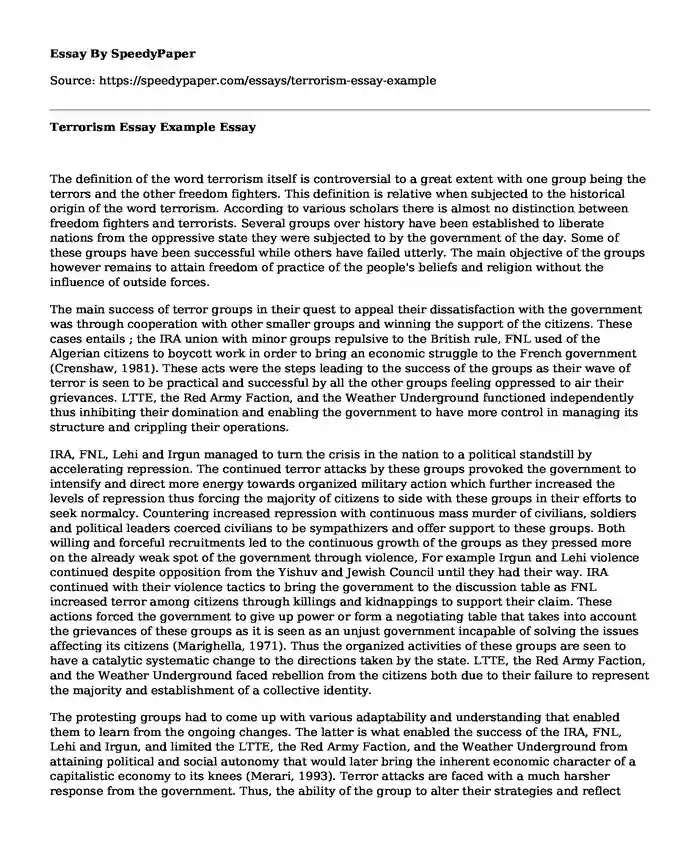The definition of the word terrorism itself is controversial to a great extent with one group being the terrors and the other freedom fighters. This definition is relative when subjected to the historical origin of the word terrorism. According to various scholars there is almost no distinction between freedom fighters and terrorists. Several groups over history have been established to liberate nations from the oppressive state they were subjected to by the government of the day. Some of these groups have been successful while others have failed utterly. The main objective of the groups however remains to attain freedom of practice of the people's beliefs and religion without the influence of outside forces.
The main success of terror groups in their quest to appeal their dissatisfaction with the government was through cooperation with other smaller groups and winning the support of the citizens. These cases entails ; the IRA union with minor groups repulsive to the British rule, FNL used of the Algerian citizens to boycott work in order to bring an economic struggle to the French government (Crenshaw, 1981). These acts were the steps leading to the success of the groups as their wave of terror is seen to be practical and successful by all the other groups feeling oppressed to air their grievances. LTTE, the Red Army Faction, and the Weather Underground functioned independently thus inhibiting their domination and enabling the government to have more control in managing its structure and crippling their operations.
IRA, FNL, Lehi and Irgun managed to turn the crisis in the nation to a political standstill by accelerating repression. The continued terror attacks by these groups provoked the government to intensify and direct more energy towards organized military action which further increased the levels of repression thus forcing the majority of citizens to side with these groups in their efforts to seek normalcy. Countering increased repression with continuous mass murder of civilians, soldiers and political leaders coerced civilians to be sympathizers and offer support to these groups. Both willing and forceful recruitments led to the continuous growth of the groups as they pressed more on the already weak spot of the government through violence, For example Irgun and Lehi violence continued despite opposition from the Yishuv and Jewish Council until they had their way. IRA continued with their violence tactics to bring the government to the discussion table as FNL increased terror among citizens through killings and kidnappings to support their claim. These actions forced the government to give up power or form a negotiating table that takes into account the grievances of these groups as it is seen as an unjust government incapable of solving the issues affecting its citizens (Marighella, 1971). Thus the organized activities of these groups are seen to have a catalytic systematic change to the directions taken by the state. LTTE, the Red Army Faction, and the Weather Underground faced rebellion from the citizens both due to their failure to represent the majority and establishment of a collective identity.
The protesting groups had to come up with various adaptability and understanding that enabled them to learn from the ongoing changes. The latter is what enabled the success of the IRA, FNL, Lehi and Irgun, and limited the LTTE, the Red Army Faction, and the Weather Underground from attaining political and social autonomy that would later bring the inherent economic character of a capitalistic economy to its knees (Merari, 1993). Terror attacks are faced with a much harsher response from the government. Thus, the ability of the group to alter their strategies and reflect upon the changing government tactics and counterbility is what enhances their continued growth and growing support for their ideologies. The IRA and Zionists (Irgun and Lehi) managed to maintain internal truce by teachings aimed at reminding each member what they were fighting for with their common enemy. On the other hand LTTE competed with other Tamil groups in order to make its claim more vital thus resulting to internal disintegration despite having the same claims as an oppressed community (LTTE and the peoples will, slide 15). The conflicts within RAF also weakened their internal dynamics thus crippling their ability to pressure the government for their claim.
References
Crenshaw, Martha (1981). Effectiveness of Terrorism in the Algerian war.
Marighella Carlos (1971). Minimanual of the Urban Guerrilla
Mereri, Ariel (1993). Terrorism as a Strategy for Insurgency. Terrorism and Political Violence. Volume: 5; No: 4; 213; 251.
Cite this page
Terrorism Essay Example. (2022, May 13). Retrieved from https://speedypaper.net/essays/terrorism-essay-example
Request Removal
If you are the original author of this essay and no longer wish to have it published on the SpeedyPaper website, please click below to request its removal:
- Free Essay Sample: Organizational Communication and Social Media
- Police Work with Juveniles, Essay Sample at No Charge
- Essay Sample: US Music Diplomacy in the USSR
- Essay Example with Annotated Bibliography on Cultural Globalization
- Essay Sample: Calls for Government Engagement in Food Industry Sector
- Paper Example: How important is networking?
- Free Essay Example: Causes of Nurse Burnout
Popular categories





